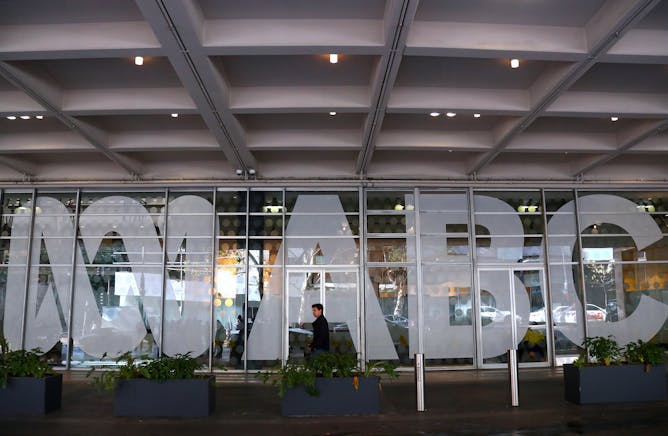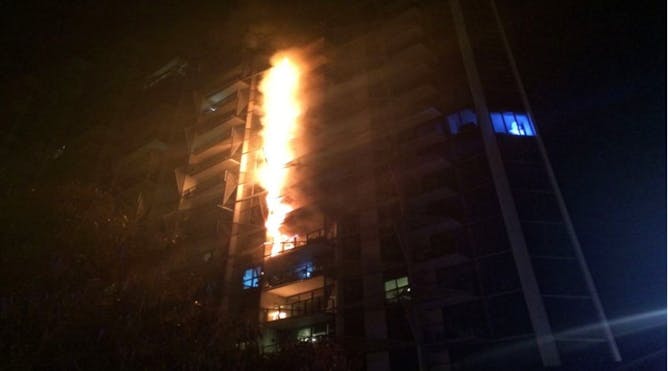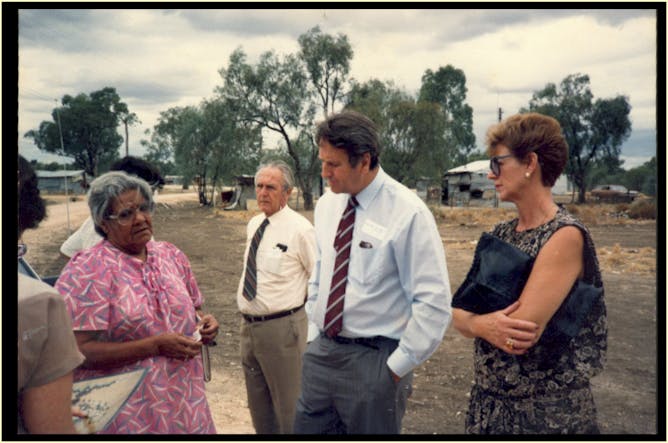|
|
|
Editor's note
|
|
This week has seen two high-profile raids on the media – on Tuesday, it was the home of News Corp journalist Annika Smethurst; yesterday, it was the ABC’s turn, for a 2017 series of stories known as “the Afghan Files”. Rebecca Ananian-Welsh writes that these events have confirmed fears raised by Australia’s enhanced data powers and broader suite of secrecy offences – namely, the demise of source confidentiality and the potentially chilling
effect on public interest journalism.
Meanwhile, building owners face costs to replace combustible cladding that Simon Lockrey and Trivess Moore calculate could add up to as much as $1.6 billion in Victoria alone if the process isn’t well handled.
|
Amanda Dunn
Section Editor: Politics + Society
|

|
|
Top story
|

On Wednesday, the AFP raided the ABCs Sydney headquarters in relation to the 2017 “Afghan files” report.
AAP/David Gray
Rebecca Ananian-Welsh, The University of Queensland
This week's raids on journalists and media outlets show not just the risk to those doing work in the public interest, but the potentially chilling effect it will have on more such journalism being brought to light.
|

The Lacrosse building fire in Melbourne’s Docklands district rang alarm bells about the risks of combustible cladding back in 2014.
MFB
Simon Lockrey, RMIT University; Trivess Moore, RMIT University
Estimated costs for Victoria alone range from hundreds of millions to as much as $1.6 billion If work to rectify buildings fitted with combustible cladding isn't well handled.
|

Isabel, on left, when she was working for Mangankali Housing Company, talking to politicians and/or bureaucrats on the Wollai, the Aboriginal reserve at Collarenebri.
Family collection, provided to author.
Heather Goodall, University of Technology Sydney
Denied an education in 1930s Australia because she was too black, Isabel Flick went on to fight segregation at her local cinema in the early 1960s. She became a powerful campaigner for Indigenous rights.
|
Science + Technology
|
-
Lacey Schaefer, Griffith University
Electronic monitoring can help deter people from committing further crimes, but it needs to be used along with other crime prevention methods.
-
Elizabeth Finkel, La Trobe University
As we enter an era where once incurable diseases become curable, be prepared for some challenging debates about how to pay for gene therapy and the value of a human life.
-
Scarlett Howard, Université de Toulouse III - Paul Sabatier; Adrian Dyer, RMIT University; Andrew Greentree, RMIT University
We're left wondering whether we as humans are so very special after all – that perhaps the ability to learn mathematics could be universal.
|
|
Education
|
-
Elizabeth Westrupp, Deakin University
When children are being clingy, they're communicating their feelings. This is normal and healthy. Parents can help by acknowledging the feelings that come with their child's behaviour.
|
|
Health + Medicine
|
-
Christopher Blyth, University of Western Australia; Kristine Macartney, University of Sydney; Samantha Carlson, University of Sydney
Children's immune systems are more vulnerable to the flu; even kids who are otherwise healthy can develop complications. The best way to protect children is by having them vaccinated.
-
Louisa Gordon, QIMR Berghofer Medical Research Institute
It is perfectly legal for a doctor working in private practice to charge what they believe is fair and reasonable. But that doesn't mean it's OK to charge tens of thousands of dollars for a procedure.
|
|
Environment + Energy
|
-
Shaun Molloy, Edith Cowan University; Robert Davis, Edith Cowan University
Here's how climate change affects recovery efforts for the elusive western ground parrot.
-
Hadeel Al-Alosi, Western Sydney University; Mark Hamilton, UNSW
Evidence shows restorative justice can help fix environmental crime – so why isn't Australia using it more?
|
|
Politics + Society
|
-
Tim Dwyer, University of Sydney; Timothy Koskie, University of Technology Sydney
The quality of Australian media was heavily criticised during the 2019 election campaign. So what can be done about it?
|
|
| |
Featured jobs
|

|
RMIT University — Melbourne, Victoria
|

|
Monash University — Clayton, Victoria
|

|
Deakin University — Waurn Ponds, Victoria
|

|
La Trobe University — Bundoora, Victoria
|
|
|
|
| |
| |
| |

|
| |
| |
| |
Featured events
|

|
The University of Sydney, Sydney, New South Wales, 2006, Australia — University of Sydney
|

|
Monash University, Level 7, 271 Collins Street, Melbourne VIC 3000, Victoria, 3000, Australia — Monash University
|

|
Monash University, Level 7, 271 Collins Street , Melbourne VIC 3000, Victoria, 3000, Australia — Monash University
|
|
|
ICC Sydney, Sydney, New South Wales, 2000, Australia — International Society on Early Intervention in conjunction with Early Childhood Intervention Australia (ECIA)
|
|
|
|
| |
| |
| |
| |
| |
|
|
|
|
|
|
|